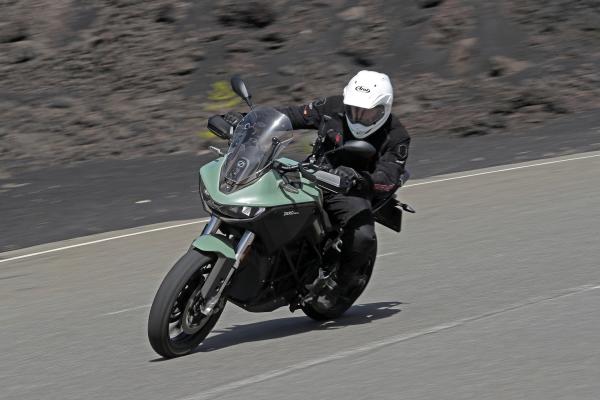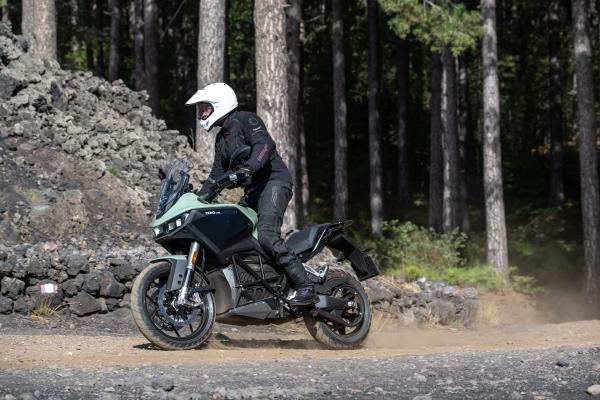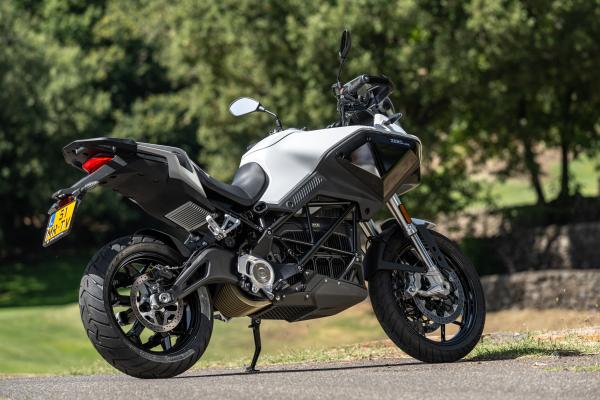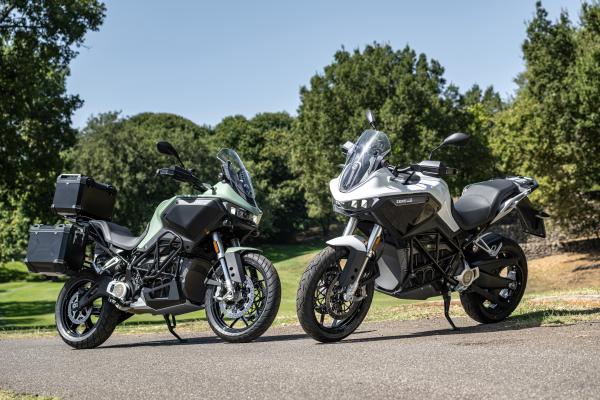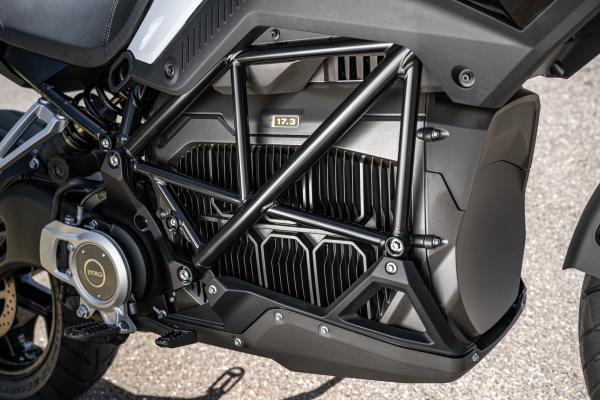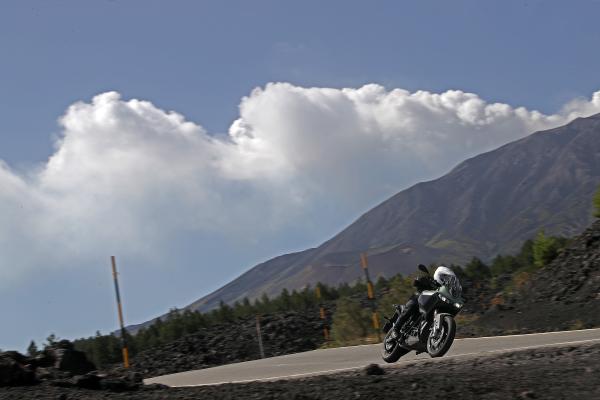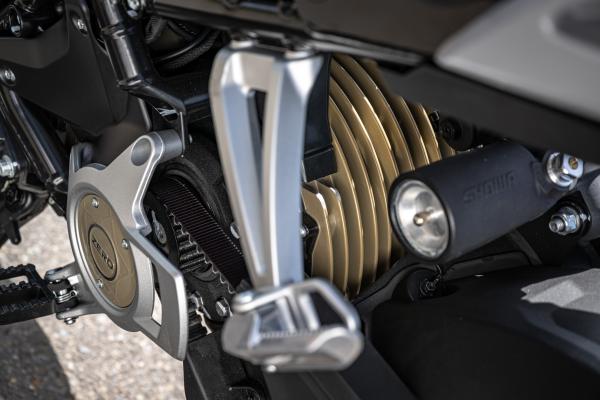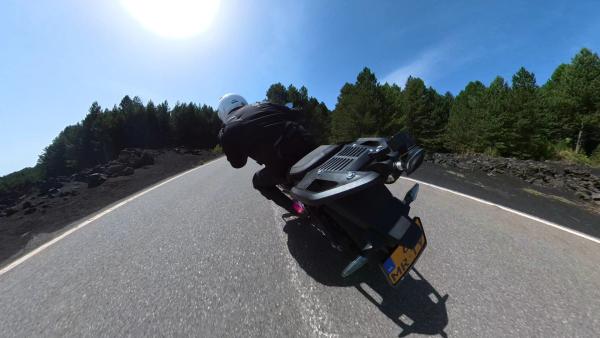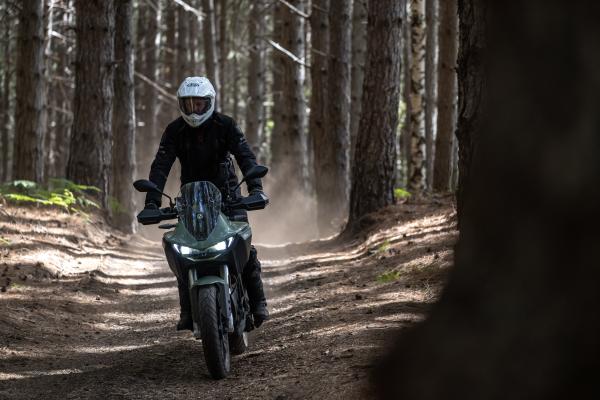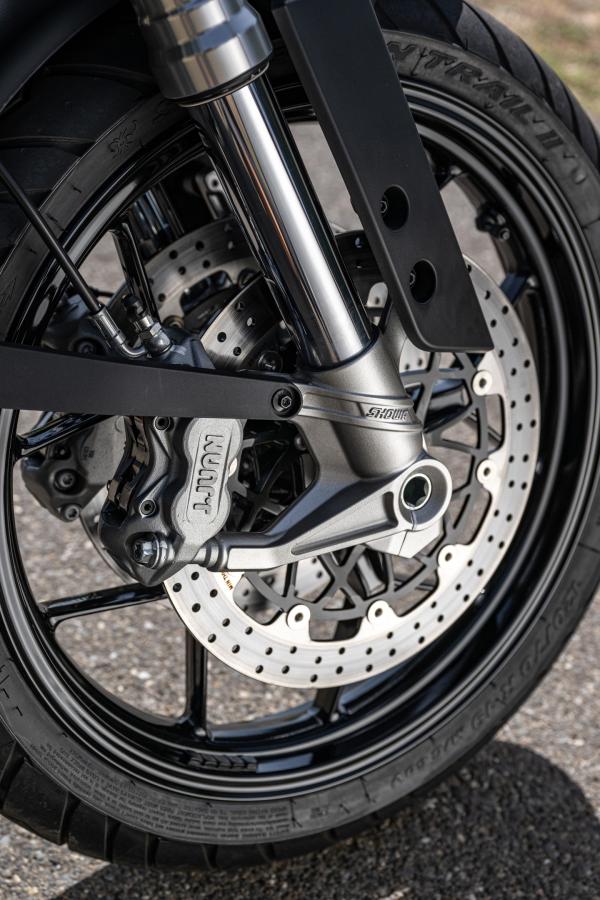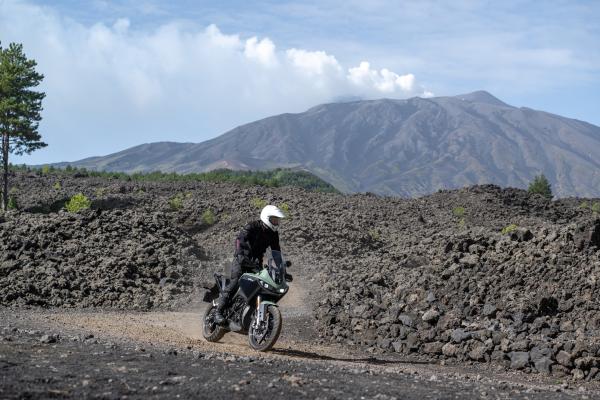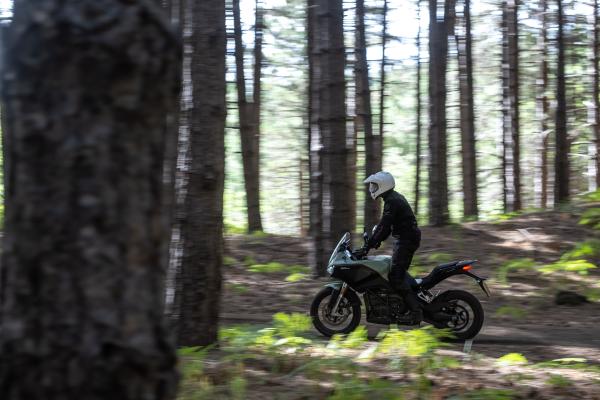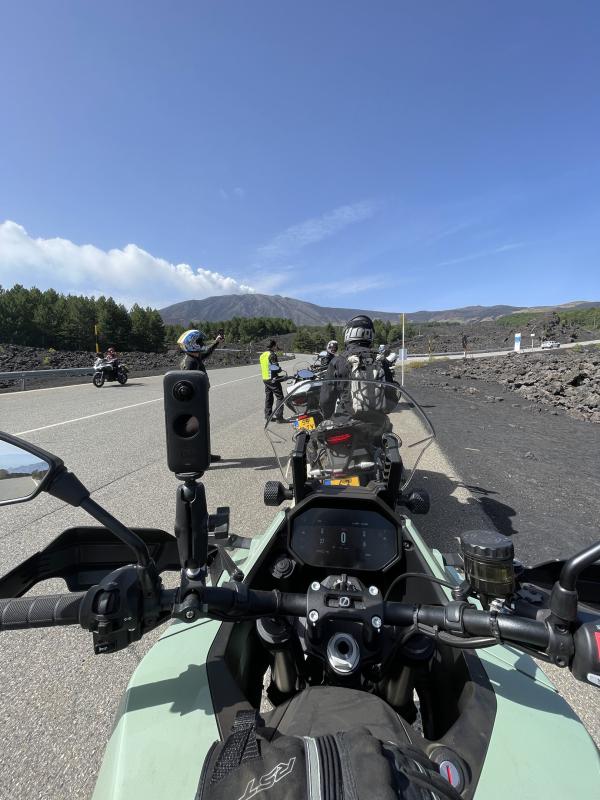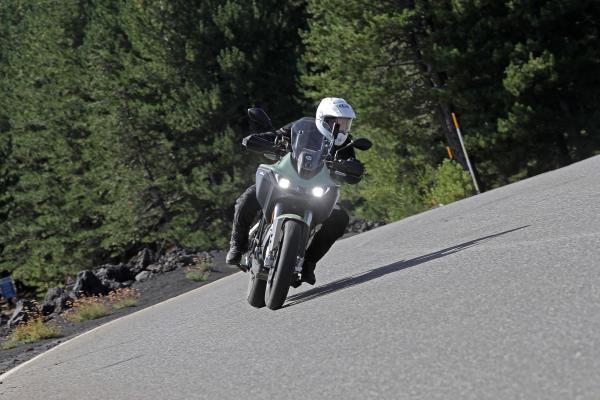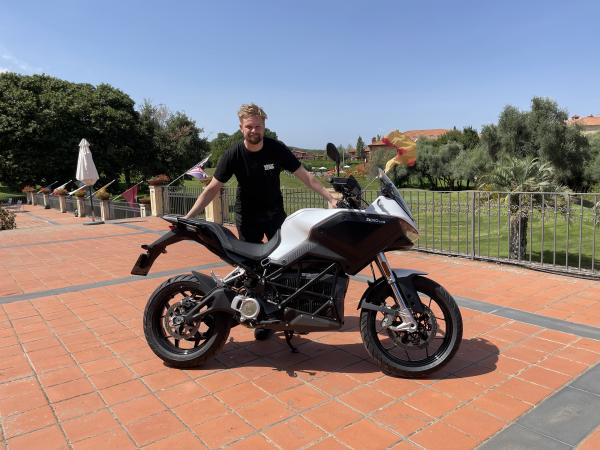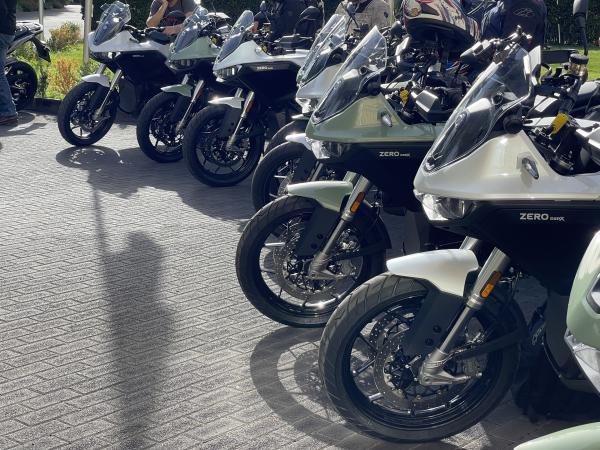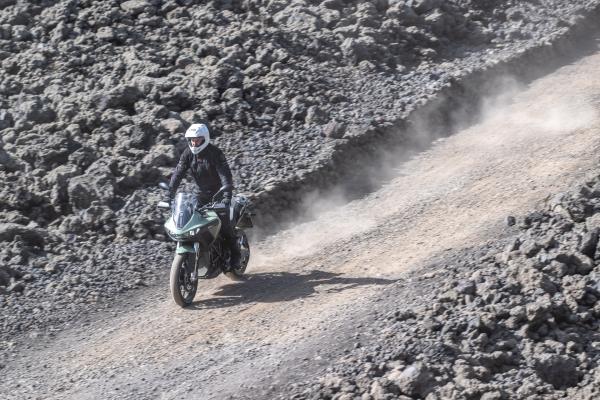Zero DSR/X (2022) Electric Adventure Review | Volcanic ride in Sicily
Does the new Zero DSR/X adventure motorcycle tick all of the right boxes to be a conquering force in the adventure touring segment?

Member for
54 years 8 monthsWe headed out to the stunning Island of Sicily, in Italy, to explore what hopes to be the most important & exciting launch in Zero Motorcycles’ history with the all-new Zero DSR/X.
The main question to be answered from this first ride; will the DSR/X do enough to divert the attention of an ostensibly stubborn adventure touring crowd, who may (naturally) prefer good ol’ dinosaur juice for their touring kicks?
Zero has been a momentous force in the electric segment of motorcycling since 2006 when it was founded in California by former NASA engineer Neal Saiki - and more recently been spearheading the electric revolution we're witnessing in the UK, particularly small-to-mid-sized machines.
Known for its current fleet of road-based motorcycles, for its initial 2 years the all-electric marque focused solely on off-road machines - in 2022, the brand new DSR/X continues their current on-road focused prowess, whilst simultaneously returning to its roots with some adventure acumen packed with Silicon Valley tech.
The DSR/X launch itself was shrouded in mystery and intrigue, with the bike under wraps up until the evening presentation - and we weren’t privy to the exact details of the machine until around 12 hours before jumping aboard.
Though, we did have an idea of what would lay in wait for us at the foothills of the active & impressive Mount Etna, as when receiving the RSVP to a ‘Zero Motorcycles Event’ we were told to pack our finest adventure gear…
Could the DSR/X belong in our list of the Best Electric Motorcycles?
Zero DSR/X 2022 - Availability and Price
The initial launch price of the Zero DSR/X is marked at £24,150 in the UK, €27,440 in Ireland, and we are told it’ll be available for tests & purchase nigh on immediately as of reading. Instantly a super premium machine, but over a potential 5 year ownership cycle (when the battery warranty ends) recharge costs of around £3.00+ may soften the inital blow.
Available from the outset in Sage Green (as ridden) & White Pearl, accessory options (including saddle bags, luggage sets, skid plates & crash bars, spoked wheels, and alternative screen options) will also be ready for purchase at launch.
As standard with Zero Motorcycles, the Cypher III+ operating system will also feature, granting the full suite of Bosch Mobility Stability Controls, hill hold control, parking mode, and the Zero Motorcycle’s app for direct connection to your bike - plus the ability to customise your own rider modes amongst other features.
Based on the framework of the Zero SR/F of 2019, the DSR/X has been in development since 2018, with the Zero team reportedly spending over 100,000 hours to craft this adventure bike capable of meeting both the demands of prospective riders and manufacturing & dealer requirements.
Instantly apparent, and explained in detail to us, is the concerted styling approach undertaken by designers, aiming to craft a sleek single piece of bodywork up front. Inspired by the feeling of flight, the flat tank surface was ‘pulled through the air’ in a way akin to the immense torque provided by electric momentum - and dubbed an essential surface & hero element. Marketing fluff aside, it does look really nice on the road.
Battery & Motor
The burning question on any electric machine is the battery, range, and the new Z-Force 75-10X motor with 225 Nm of torque and peak power of 100 bhp. So let’s dive into that.
Range & Recharging
The Zero DSR/X features a Z-Force 17.3 kWh lithium power pack with a quoted range of 111 miles combined, 85 miles highway, and 180 miles in the city. Certainly numbers that will divert a tour off the quickest route, and not quite the 140 mile range we found on the pricier Energica Experia.
Distinctly electric numbers, recharge times are quoted at 2 hours to 95% with Level 2 charge, 10 hours to 95% with Level 1 charge (so your plug at home), and 1 hour to 95% with the optional accessory fast charger that’ll eat into some of the tank storage space to accommodate. Or, you can opt for a bonus battery in the cavern to provide an extra reserve of range.
Over the course of the launch ride, we covered 50 miles, setting off at 110% charge - you can choose to use all of the cells on occasion, rather than leaving some in reserve for the longevity of the battery, though constantly doing so will potentially invalidate a battery warranty claim (5 year/unlimited mileage) - returning back to base at 46% charge remaining.
My range was therefore likely to be under 100 miles from a full charge, giving a bit of credence to the above-estimated ranges considering the fast route we undertook.
With the launch ride consisting of fast sweeping bends, jaunts off-road and cruises through sleep Sicilian villages, it was a fairly accurate portrayal of what a standard tour would look like. Others on the ride finished anywhere between 50-60% of charge remaining, and we were all on pace with each other. Given it was a fairly scientific test with the same ambient 32ºC temperature for all, I’m left to believe your weight as a rider will heavily impact range figures.
Motor
As for the power on offer from the Zero proprietary designed air-cooled motor, it was truly electric. A single gear feeds a belt drive (which is 2.5 times stronger than the SR/S & SR/F) to rocket you to 60mph in seconds, with power seemingly modulated in the first few mph to provide smooth acceleration. Top speed is limited to 111 mph, and you have a handful of pre-set rider modes to select: Standard, Sport, Rain, Eco, Canyon - plus additional variations when considering the switchable traction control and ABS (which can be fully switched off when diving into the menus for those who fancy it).
Acceleration is noticeably fastest in Sport mode, with a personal caveat being regenerative engine braking is seemingly set to minimal. Close the throttle in Sport and I’d liken it to pulling in the clutch, you feel like you’re just freewheeling, which isn’t ideal mid-corner if you’re going in a bit hot - more on that later.
Canyon mode is said to have the most regen braking on offer, and it’s what I settled on when descending from the hills of Mount Etna. Speaking to a Zero technician, a custom set mode via the phone app is the ideal solution, where you can set the percentage of engine braking on the release of the throttle, alongside further second engine braking applied when adding brakes. In comparison, the Energica Experia has far greater engine braking, which can intuitively be set independent from the other riding modes.
A classic electric trait, overtakes are easy and overall acceleration is rocket-ship-esque. Though, in the 32ºC heat, rapid acceleration did flash up the overheating warning - though seemingly with no influence on performance. Just prior, an error for the stability control flashed up and seemed to linger, then disappeared towards the end of the ride.
Zero DSR/X Handling, Brakes & Suspension
Sitting at 247kg in running order with a new steel trellis framework for the frame & subframe, the DSR/X is a big, tall, & heavy prospect. An 828mm seat felt much lower in reality, akin to sitting inside the bike rather than on it, and it seemed even the shorter riders in the group had no struggles getting boots to ground. A 1525mm wheelbase with 50/50 weight distribution means that once rolling, the bike felt predictable & balanced in corners, and happy to sit at a consistent speed with the built-in cruise control.
Adjustable Showa suspension (preload, rebound, compression) features 47mm Separate Function forks up front, and a 46mm piston at the rear. On the road it certainly felt soft, soaking most bumps with ease but occasionally unsettled by successive bumps in the otherwise pristine roads of Sicily.
Braking power is provided by J.Juan, dual discs with radially-mounted 4-piston calipers up front on a 19” wheel, and single disc at the rear with a floating caliper on a 17” wheel. For general tour riding the brakes are perfectly adequate, and the Bosch Advanced MSC stability control, off-road brake settings, and combined braking (eCBS) were adequate to brush off speed smoothly.
My bone to pick with the brakes: when the bike is being pushed hard and coming in too hot to a corner, you can feel the ABS begin to chatter away, and heavy application did induce a slight squirrelly feel underneath. You can fiddle with the brake mode to smooth this out, but combined with the apparent lack of significant engine braking, any attempt to adjust your speed mid-corner could leave you red-faced and/or in a bush, a slight tap of the rear when leaning sometimes inducing a little judder that’s well worth avoiding.
Off-road, the brakes did the job nicely, and the suspension was happy to soak up surprisingly rough terrain with ease. If you’re into launching 247kg machines in the air and continuing your progress, you’re in luck here.
One note, the rear brake lever seemed to sit a tad high & left from where my right boot assumed it’d be found, remedied by a slightly awkward lift of the foot to apply braking force. Though, with a comfortable standing position on bear-trap pegs, off-road the rear brake seemed to be positioned perfectly.
Adventure Touring Acumen & Spec
If this really is an adventure bike, can it do it all - including off-road riding?
We spent a good hour of the ride sampling some rugged volcanic scenery, and though the test bikes were shod with on-road biased Pirelli Scorpion Trail II hoops over the Pirelli Scorpion Rally STR knobbly homologated option, for the most part, the DSR/X impressed when venturing off-road.
It’s an interesting choice for the wheels, opting for a 19” front as opposed to a larger 21” wheel for off-road riders who may consider this over the KTM 1290 Super Adventure R, Honda Africa Twin, BMW R1250 GS (to name but a few).
A vital consideration if you venture off-road on this, is just how sensible to need to be with the throttle. Admittedly on-road hoops were present, but at just the scent of a throttle twist, the rear will spin up and control could be easily lost. At times it felt like walking an eager hungry dog through a squirrel-infested forest; nose poking about and tail swinging wildly.
As for on-road touring, fast sweeping corners were absolutely eaten up, the electric motor whining like a 4 am karaoke contestant, encouraging you to push on. It loves a corner, and the linear delivery of power made light work of successive bends.
It’s a comfortable place to be, also. Though the pegs seem to be a tad tucked back than expected for my 6’3” frame, our first ride didn’t have enough time in the saddle to comment on long-term comfort - though I didn’t finish the ride with any aches at all.
As for spec here, the 5-inch TFT dash was colourful yet prone to glare from intense sunlight. The twist-to-adjust screen was a delight to use, though wind protection offered left a bit to be desired. The mode buttons were a tad complicated to get used to, but every manufacturer has their own language here - I often switched on the heated grips rather than change mode.
Weirdly, hazard lights are a trigger at the back of the left handlebar out of sight - perhaps a better place for a ‘back’ button. A 12 V charge port is up front, and a 28 Litre storage compartment is useful, though accessing it must be done with the ignition key - no separate button, so switch off the bike and reset your riding mode each time you want to grab a drink/map/phone. You also have compartments tucked away to the left and right of the tank for other bits, though it’s not as easy to access these quickly.
Hill hold control is a nice touch, though is only active for around 3 minutes before suddenly de-activating itself - a lovely surprise when chatting away on an incline.
On that, electric motorcycles seriously need a handbrake as standard, as you can’t leave this one ‘in gear’. Apparently, Bosch won’t allow the hill-hold function to be used as a parking brake due to the requirement of constant pressure on the unit, so… chocks it is. At least there is room in the storage compartment for those.
What we like & don’t like
Like:
- Constant updates wirelessly via Cypher 3+
- A tourer that you can actually take off-road
- Electric fun on the open road
Dislike:
- Brakes & engine braking leave a bit to be desired when pushing on
- Plenty of ride mode tweaking potential, but not a huge difference between standard set modes.
- Should modern bikes require old-fashioned chocks to park on a hill?
Zero DSR/X Verdict
The new Zero is a charming tourer and a glance into the potential for the future of adventure motorcycles that are up for a bit of real adventuring. Perhaps the range topping out at around 100 miles combined is a bone of contention, and an ever-growing infrastructure will need to make electric touring more feasible - but as a road-going machine, it’s a great bit of kit.
Is this the future of electric adventure motorcycles? The foundations are there, certain issues need ironing out before I believe the current crop of ICE adventurers should be concerned, but it’s certainly a big step in the right direction - well worth a test ride given the chance, even just to form your own opinion on the potential future of motorcycling and adventure touring.
Caveats of electric motorcycles certainly ring true, here. Whilst your mileage will genuinely vary per rider, if planning a long tour you’ll have to be content with the odd detour with recharge stops thoroughly thought out ahead of time.
Zero Motorcycles has clearly spent a long time crafting what they believe to be the perfect future adventure motorcycle. The foundations here are strong, and with advancements in batteries & recharging tech, they could be onto a winner - in my opinion, provided the price comes down to suit an easy transition from combustion engine alternatives.
Minor tweaks in future iterations may well be needed, but the DSR/X certainly impressed me in the short time I spent aboard exploring the Sicilian surroundings.
Thanks to Zero Motorcycles for having us on the launch, head to their website for more information.
